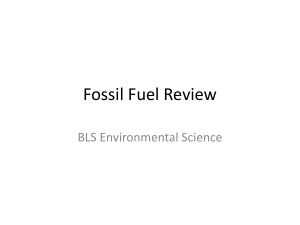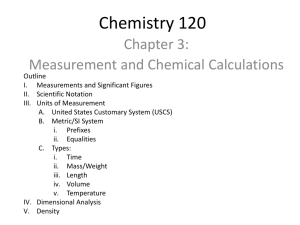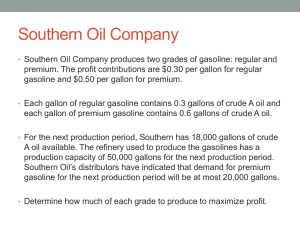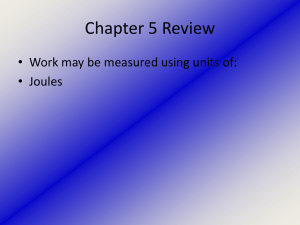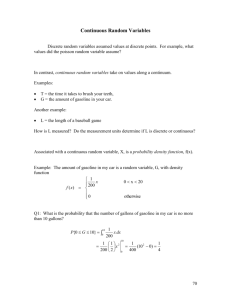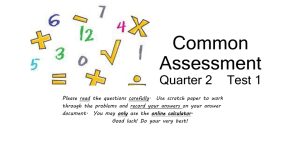6C - Nebraska Department of Environmental Quality
advertisement
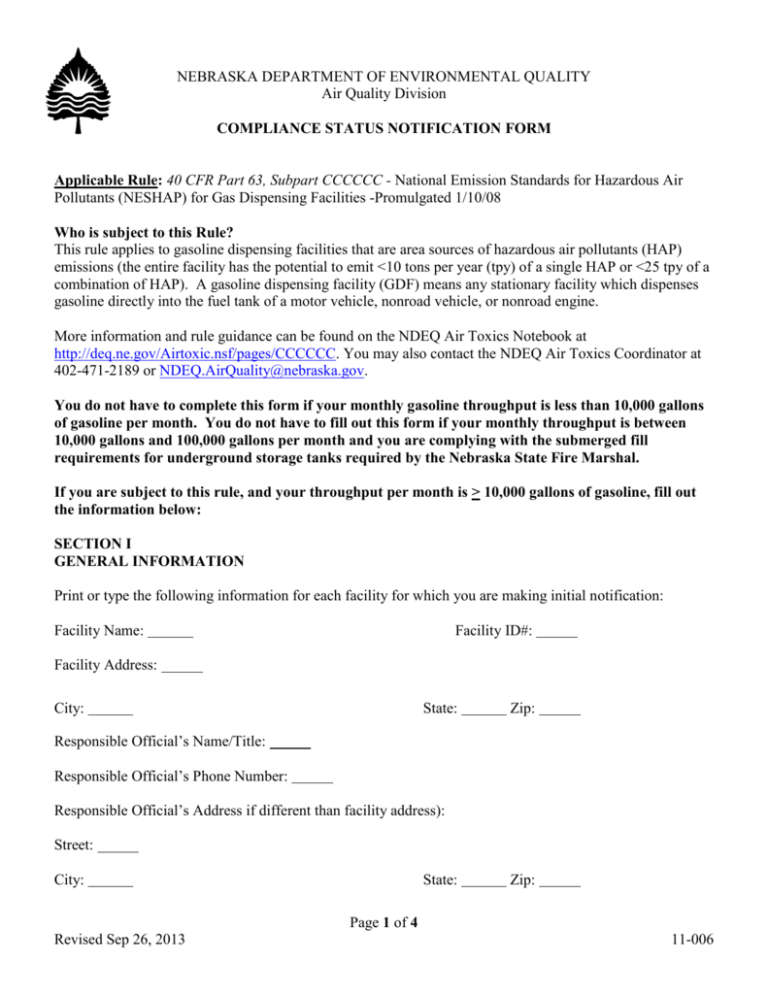
NEBRASKA DEPARTMENT OF ENVIRONMENTAL QUALITY Air Quality Division COMPLIANCE STATUS NOTIFICATION FORM Applicable Rule: 40 CFR Part 63, Subpart CCCCCC - National Emission Standards for Hazardous Air Pollutants (NESHAP) for Gas Dispensing Facilities -Promulgated 1/10/08 Who is subject to this Rule? This rule applies to gasoline dispensing facilities that are area sources of hazardous air pollutants (HAP) emissions (the entire facility has the potential to emit <10 tons per year (tpy) of a single HAP or <25 tpy of a combination of HAP). A gasoline dispensing facility (GDF) means any stationary facility which dispenses gasoline directly into the fuel tank of a motor vehicle, nonroad vehicle, or nonroad engine. More information and rule guidance can be found on the NDEQ Air Toxics Notebook at http://deq.ne.gov/Airtoxic.nsf/pages/CCCCCC. You may also contact the NDEQ Air Toxics Coordinator at 402-471-2189 or NDEQ.AirQuality@nebraska.gov. You do not have to complete this form if your monthly gasoline throughput is less than 10,000 gallons of gasoline per month. You do not have to fill out this form if your monthly throughput is between 10,000 gallons and 100,000 gallons per month and you are complying with the submerged fill requirements for underground storage tanks required by the Nebraska State Fire Marshal. If you are subject to this rule, and your throughput per month is > 10,000 gallons of gasoline, fill out the information below: SECTION I GENERAL INFORMATION Print or type the following information for each facility for which you are making initial notification: Facility Name: Facility ID#: Facility Address: City: State: Zip: Responsible Official’s Name/Title: Responsible Official’s Phone Number: Responsible Official’s Address if different than facility address): Street: City: State: Zip: Page 1 of 4 Revised Sep 26, 2013 11-006 This form must be completed, signed, and submitted to NDEQ 60 days following your compliance date. NDEQ Air Quality Division 1200 ‘N’ St. Atrium, Suite 400 Lincoln, NE 68509-8922 If your facility is located in Omaha or Lancaster County, you must submit a notification to the appropriate local air pollution control agency. SECTION II APPLICABILITY AND COMPLIANCE STATUS Applicability Questions (initial in box beside correct answer to the following questions) Yes No Yes No A1. Is your facility a “gasoline-dispensing facility”? Gasoline-dispensing facility means any stationary facility that dispenses gasoline directly into the fuel tank of a motor vehicle, nonroad engine, or nonroad vehicle. A2. Does your facility receive and dispense any type of gasoline other than aviation gasoline? If you answer “No” to either of the above questions and can support your answer, then you are not subject to the control requirements listed below; however, you must still complete Sections III and IV (below) and mail as directed. If prior to January 10, 2008, your facility is meeting the control requirements of C1, C2, and C3, as applicable, under an enforceable State, local, or tribal rule or permit, then this notification is not required to be submitted. gallons per month Loaded into Dispensed from A4. What is the facility’s monthly throughput? Monthly throughput is the total volume of gasoline loaded into, or dispensed from, all the storage tanks at the gasoline dispensing facility. Monthly throughput is calculated by summing the current day’s gasoline loaded or dispensed plus the previous 364 day’s total and dividing by twelve. A5. Does your facility calculate monthly throughput based on the volume loaded into or dispensed from the storage tanks? Page 2 of 4 Revised Sep 26, 2013 11-006 Control Questions Yes No Yes No Yes No NA C1. Do you require that gasoline be handled in a manner that restricts vapor releases to the atmosphere for extended periods of time? Measures to be taken include, but are not limited to, the following: (1) Minimize gasoline spills (2) Clean up spills as expeditiously as practicable (3) Cover all open gasoline containers and all gasoline storage tank fillpipes with a gasketed seal when not in use (4) Minimize gasoline sent to open-waste collection systems that collect and transport gasoline to reclamation and recycling devices, such as oil/water separators. C2. If the monthly gasoline throughput of your facility is greater than or equal to 10,000 gallons per month, is submerged filling (as specified in section §63.11117(b)) currently used for all gasoline storage tanks having a capacity of greater than or equal to 250 gallons? C3. If the monthly gasoline throughput of your facility is greater than or equal to 100,000 gallons per month, is vapor-balanced filling (as specified in section §63.11118(b)) currently used for all gasoline storage tanks except (1) Tanks constructed on or before January 10, 2008, with a capacity of less than 2,000 gallons (2) Tanks constructed after January 10, 2008, with a capacity of less than 250 gallons (3) Tanks equipped with floating roofs, or the equivalent? Source Type & Compliance Dates Yes No Yes No S1. Was your facility constructed or reconstructed prior to November 9, 2006? If yes, you are an existing source. If no, you are a new source. A3. Does your facility only dispense gasoline into nonroad vehicles or engines? If you answered yes, you have alternate compliance dates. o Existing Source Compliance Date o January 10, 2011 o Only load gasoline into nonroad engine or vehicle = January 24, 2014 o New Source Compliance Date o January 10, 2008 or upon startup o > 100,000 gallon monthly throughput Startup between 11/9/06 - 9/23/08 = September 23, 2008 Startup after 9/23/08 = upon startup o Only load gasoline into nonroad engine or vehicle = January 24, 2011 Submit this form within 60 days of your compliance date. Page 3 of 4 Revised Sep 26, 2013 11-006 SECTION III SOURCE DESCRIPTION Briefly describe the source. Provide (at least) information on the number and capacity of gasoline storage tanks and the average monthly gasoline throughput. SECTION IV CERTIFICATION Print or type the name and title of the Responsible Official for the facility: Name: Title: Telephone no.: A Responsible Official can be: The president, vice president, secretary, or treasurer of the company that owns the facility; An owner of the facility; The plant engineer or supervisor of the facility; A government official, if the facility is owned by the Federal, State, City, or County government; A ranking military officer, if the facility is located at a military base. I CERTIFY THAT INFORMATION CONTAINED IN THIS REPORT TO BE ACCURATE AND TRUE TO THE BEST OF MY KNOWLEDGE. ____________________________________________ (Signature of Responsible Official) (Date) Page 4 of 4 Revised Sep 26, 2013 11-006
